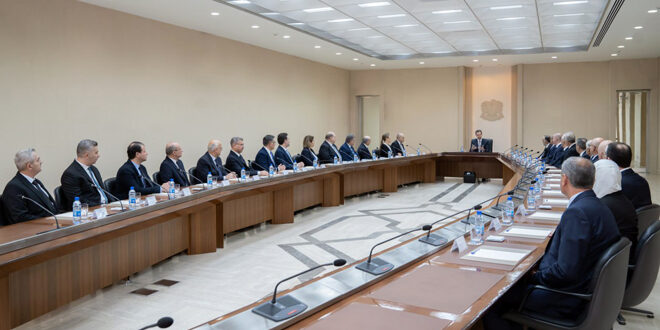On Tuesday, President Bashar al-Assad chaired the first meeting of Syria’s newly-formed government after ministers took the constitutional oath. In his address, Assad outlined his vision for the new cabinet, emphasizing the importance of practical governance and the need to lower public expectations amidst the country’s ongoing challenges.
“We cannot rely much on what some call openness to Syria,” Assad said, referring to potential foreign engagement. He argued that “openness with a political character will not carry the economy, not because of the political circumstances, the siege, or the fear of Western sanctions,” dismissing the notion that foreign investments could be the key to economic recovery. He pointed out that even before the war, Syria’s economy was not built on foreign investments, calling the belief in their impact “a kind of illusion.”
Assad stressed that Syria’s real issues stem from internal mismanagement rather than external pressures. “The problem is not the war or limited resources, but rather mismanagement,” he acknowledged. “Sometimes the problem is not the lack of resources, but in the poor distribution of resources among sectors of society and citizens.”
Assad’s Government Reshuffle: More of the Same Under the Guise of Change
The president also called on his government to manage expectations carefully. He urged ministers to avoid overpromising and to distinguish between what is possible and what is merely hoped for. “The first way to facilitate the government’s work in these difficult circumstances is for this government to be a government of reality, not a government of dreams. No one wants a mirage,” Assad said, cautioning against raising hopes that cannot be fulfilled. He pointed out that unrealistic promises leave both officials and citizens “panting after fulfilling these promises without being able to achieve them,” which only leads to more frustration and criticism.
President Assad stressed the importance of basing government policies on facts and events rather than wishful thinking. “Here, there are no hopes; there are facts and events,” he said, urging a more grounded approach to governance in these challenging times.
The president’s remarks also underscored the importance of clear, transparent communication regarding government policies. He encouraged the new cabinet to focus on realistic, actionable goals in their ministerial statements and to clearly explain the reasons behind policy decisions, as well as the potential costs of not following them. “We must clearly explain the policies… explain the sectoral policies… explain the ministerial policies… and explain the objective reasons, motives, obstacles, and challenges that push towards those policies,” he stated.
“Investment sector”
Assad acknowledged the challenges in coordinating policies between ministries, which he identified as a weak point in the current administration. “Coordination between institutions is through policies. When policies are not coordinated, the team cannot coordinate,” he said, adding that stronger policy coordination would lead to more effective governance.
In addition, Assad touched on the need for sectoral reform, specifically addressing outdated laws such as the Basic Law on State Employees, which was enacted four decades ago. “The world has changed today, and sectors have become so different… Can we develop the country with one law instead of several specialized laws for each sector?” he questioned, advocating for tailored legal frameworks that better serve the country’s needs.
He also emphasized the significance of Syria’s technical sector, describing it as an “investment sector” driven by talented minds. This sector, he argued, cannot be besieged and holds the future for Syria’s next generations.
On the topic of decentralization, Assad urged caution, warning that prematurely distributing powers to municipalities could transfer existing problems to other regions. He advocated for institutional development before implementing decentralization measures.
Finally, Assad highlighted Syria’s regional commitments, calling for support to Lebanon amid the Israeli aggression. He urged his government to assist Lebanon in all fields and sectors without hesitation, reinforcing Syria’s solidarity with its neighbour.
The new government now faces the challenge of managing these expectations while addressing the economic and social burdens of the Syrian people.
This article was translated and edited by The Syrian Observer. The Syrian Observer has not verified the content of this story. Responsibility for the information and views set out in this article lies entirely with the author.


